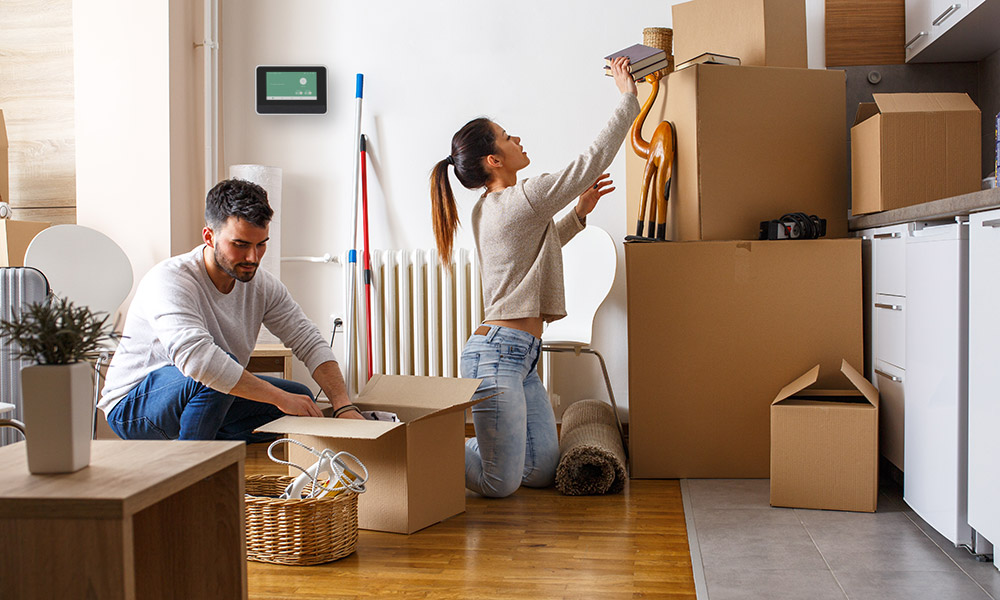Buying or building a new house is a significant life event for everyone. It’s the beginning of something new and exciting. However, there are many things to think about, and the moving process can be stressful and overwhelming. There’s a lot to do before you can truly settle into your new home, from moving and unpacking to establishing utility services and getting to know your new neighbourhood. Everything from planning your relocation to unpacking your last box and making your new house feel like home is covered in this thorough handbook.
Before You Move In
- Inspect your new home – If you’re moving into a property with previous owners, it’s crucial to inspect it for damages. Look for cracks in the walls, ceiling, and floor, leaks in the plumbing, and signs of mould and mildew in the bathroom and toilet. Address any issues before moving in.
- Change of address – Inform your friends and family, utility companies, and important institutions of your new address. Set up new accounts for utilities, internet, and phone services, and redirect your mail. Don’t forget to update your bank and insurance companies, as well as your doctor and dentist.
- Take care of utilities – Ensure that your utilities, like gas and electricity, water, and heating/cooling work properly. Take an accurate reading of your gas and electricity metres, and consider reviewing and changing your supplier if necessary. Also, ensure your heating/cooling system is working, and schedule a maintenance appointment if needed.
- Protect your home – Change the locks on all exterior doors as soon as possible to be safer and make your new place feel like home faster. Check windows for security, and consider installing smoke detectors or a security system. If you have children or pets, ensure that your home is safe for them.
- Create a home inventory – Keep track of your belongings and ensure nothing is lost or damaged during the move. Consider creating a checklist or using an app to make the process easier.
- Prepare for maintenance – Have all the necessary tools and equipment to complete any necessary repairs or maintenance tasks. Stock up on basic tools such as a hammer, screwdrivers, and pliers, and keep them in a handy location.
Unpacking Efficiently
- Start with essentials – Unpack the items you’ll need immediately, such as bedding, toiletries, and kitchen essentials. This will make the first few days in your new home more comfortable and stress-free.
- Label boxes – Label boxes clearly with the room they belong in and a brief description of the contents. This will help you find things easily and avoid the hassle of opening every box to find what you need.
- Organise your space – As you unpack, take the time to organise your space. Consider how you’ll use each room and arrange the furniture accordingly. Take measurements before you move in to ensure everything fits in its intended location.
- Use storage solutions – Use storage solutions to keep your home organised and clutter-free. This could include shelves, cabinets, and closet organisers. Consider using under-bed storage for out-of-season clothing and other items.
- Get rid of unwanted items – Use the move as an opportunity to get rid of unwanted items. If anything is still in usable shape, you may give it to a local charity or sell it online.
Settling In
- Meet your neighbours – Introduce yourself to your new neighbours and get to know the community. Join local groups and organisations to get involved and meet new people.
- Get out and about – It’s important to get a feel for your new neighbourhood. Visit local attractions, restaurants, and shops to get a feel for the area.
- Make your home your own – Personalise your new home by adding your own personal touches. Hang artwork, display family photos, and add decorative accents to make the space feel like yours.
- Get to know your home’s systems – Take some time to get familiar with your home’s systems, such as your heating and cooling system, electrical system, and plumbing. This will help you to quickly identify any issues that may arise and prevent them from becoming larger problems.
- Plan for maintenance – Develop a maintenance plan for your home. This should include regular cleaning, seasonal maintenance tasks, and scheduling professional inspections as needed. A maintenance plan will help you to keep your home in good condition and avoid costly repairs down the line.
- Meet with service providers – Meet with service providers such as landscapers, cleaners, and pest control companies to establish relationships and set up regular services. This will help you to keep your home in good condition and ensure that it stays pest-free.
- Plan for future renovations – If you’re planning on renovating your home in the future, start planning early. Determine your budget, create a design plan, and hire reputable contractors to complete the work.
Keeping Your Head in the Game While Relocating
Moving can be a stressful and emotionally taxing experience. Not only are you uprooting your life and leaving behind familiar surroundings, but the actual process of moving can be physically demanding and mentally exhausting. It’s essential to take care of your mental health during the move to ensure a smooth transition and avoid burnout.
Here are some moving tips on keeping your mental health in check during a move:
- Take breaks – Moving is a non-stop process, but it’s crucial to take breaks and give yourself time to rest and recharge. Dedicate some time every day to a pleasurable activity you like, such as taking a stroll, reading a book, or soaking in the tub.
- Practice self-care – Disruptions to your daily routine may arise, so it’s important to prioritise self-care during this time. This can include eating well, getting enough sleep, and staying hydrated.
- Reach out for support – Moving can be a lonely experience, but you don’t have to go through it alone. Reach out to friends and family for support, or consider joining a local community group to meet new people and build connections.
- Manage your expectations – Being an overwhelming endeavour, managing your expectations during a move is essential. Recognise that it’s okay to feel stressed or anxious during this time and that things may not go as smoothly as planned. Hire a man and van if you have to. Be kind to yourself and focus on the positives of your new home and community.
Conclusion
If you’re willing to put in the work, moving into a new home may be as exciting as it is challenging. You should have no problem getting settled in and making the most of your new digs if you follow the instructions in this guide. Don’t be a wallflower – introduce yourself to your new neighbours and give your new place a unique look and feel.





